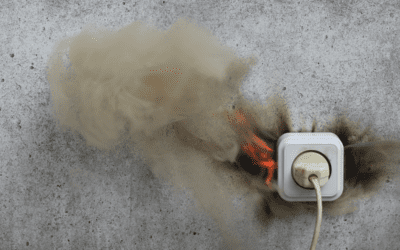Electrical Safety Is Not Shocking
Written By
Residential | Safety
Obviously we want to avoid any chance of electric shock or other electrically caused injury. If you are unsure about any electrical issue around the home, we suggest you contact a registered master electrician such as Lake Road Electrical.
With the help of a Master Electrician, Safety Need Not Be A Concern.
There are four main kinds of electrical injuries that can occur around the home: electrocution (causes death), electric shock, burns, and falls. These injuries can originate from direct contact with the electrical energy, electrical arcs that leap to a person who is grounded, thermal burns consisting of flash burns from heat generated by an electric arc, flame burns from materials that capture on fire from heating or ignition by electrical currents, and muscle contractions from electric shock can trigger an individual to fall. High voltage contact burns can burn internal tissues while leaving just really small injuries on the outside of the skin.
Here are some tips to stay safe around electricity:
1) Inspect tools, power cables, and electrical fittings for damage or wear prior to each use. Repair or replace damaged equipment immediately.
2) Always tape or fix loose cords to walls or floors. Do not use nails and staples as these can damage cables triggering fire and shock dangers.
3) Use cords or devices that are rated for the level of amperage or wattage that you are utilising.
4) Always use the right size fuse. Replacing a fuse with a larger size can trigger extreme currents in the wiring and possibly start a fire.
5) Be mindful that warm or hot outlets might be an indication that risky electrical wiring conditions exists. Disconnect any cords to these outlets and do not use them until a qualified electrician has examined the wiring.
6) Always use ladders made of wood or other non-conductive products when dealing with or near electrical energy or power lines.
7) Place halogen lights away from flammable products such as fabrics or curtains. Halogen lights can end up being very hot and may be a fire threat.
8) The risk of electrical shock is greater in areas that are damp or moist. Always be safe when using any kind of electrical equipment in wet areas. E.g. Hair dryers in bathrooms etc.
9) Install Residual Current Devices, also know as RCD, as they will disrupt the electrical circuit prior to death or serious injury occurring.
10) Make sure that exposed receptacle boxes are made of non-conductive products.
11) Know where the breakers and fuse boxes lie in case of an emergency.
12) Label all breaker and circuit box plainly. Each switch should be positively identified regarding which circuit or home appliance it is for.
13) Do not use outlets or cords that have exposed wiring.
Do not obstruct access to circuit breakers or circuit boxes and do not touch a person or electrical device in case of an electrical mishap. Always disconnect the circuit first.
RCD circuit breakers can be retrofitted to your old switchboard, but if your switchboard is an older style from the 80’s or earlier, you may want to consider a replacement of the whole switchboard. This can eliminate many of safety issues you may be facing.
Power tools used incorrectly can be electrically harmful. Detach power supply before switching tools. Ensure tools are appropriately grounded or double-insulated. The grounded tool should have an authorized 3-wire cable with a 3-prong plug. This plug needs to be plugged in an effectively grounded outlet. Do not use electrical tools in wet conditions or damp locations unless the tool is connected to a ground fault circuit interrupter (GFCI).
Never ever utilise extension cables as permanent electrical wiring. Use extension cords just to briefly provide power to an area that does not have a power outlet. Keep power cables away from heat, water and oil. They can harm the insulation and trigger a shock. Do not allow cars to pass over unguarded power cords. Examine power cords and plugs daily; discard if worn or harmed. Keep power cables clear of your power tools when in use.
Electrical safety is simple, but electricity must be respected and precautions taken to prevent injuries. We are passionate about electrical safety at Lake Road Electrical, and safety will always come first when it comes to anything electrical.
Be aware and be safe.
If you need help with from a residential or commercial electrician, make sure you contact a Master Electrician. Our team of Master Electricians at Lake Road Electrical can help with any of your electrical requirements, keeping you and your family safe. Contact us now for a free quote.
More Posts
Christmas Lights: Key Tips for Safe Installation of Festive Decorations
With the festive season nearly upon us, it’s about that time to break out the twinkling lights and eye-catching decorations. But before you start decking the halls, let’s take a moment to discuss making sure all your electrical setups are safe and sound.
DIY Electrical Safety Tips for Homeowners
We share 7 smart tips to help you keep your home warm without overspending, ensuring you enjoy the season.
Slash Your Winter Energy Bills with These Smart Tips
We share 7 smart tips to help you keep your home warm without overspending, ensuring you enjoy the season.



